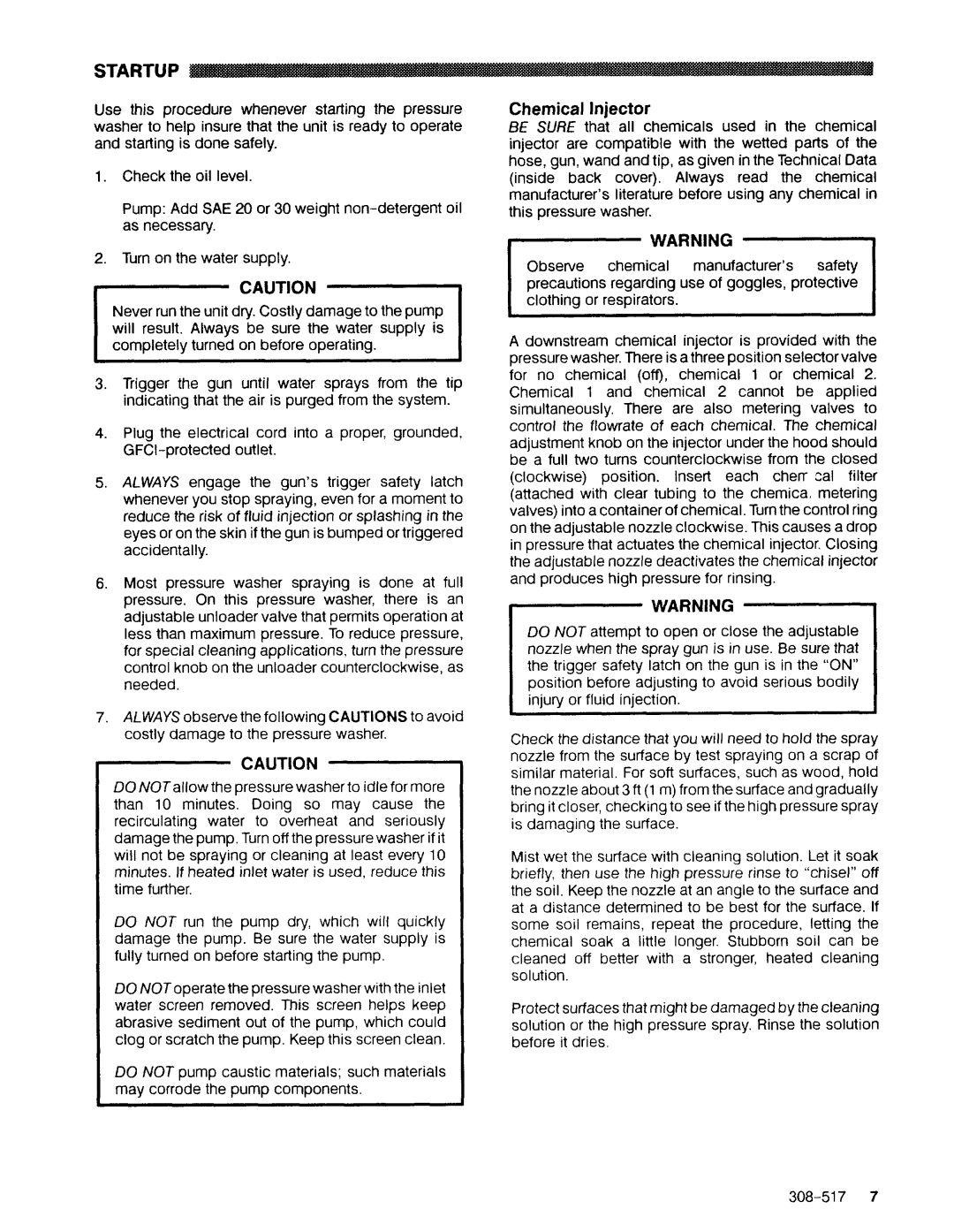
Use this procedure whenever starting the pressure washer to help insure that the unit is ready to operate and starting is done safely.
1.Check the oil level.
Pump: Add SAE 20 or 30 weight
2.Turn on the water supply.
Never run the unit dry. Costly damage to the pump WIII result. Always be sure the water supply IS
c completely turned on before operating.
3.Trigger the gun until water sprays from the tip indicating that the air is purged from the system.
4.Plug the electrical cord into a proper, grounded,
5.ALWAYS engage the gun’s trigger safety latch whenever you stop spraying, even for a moment to reduce the risk of fluid injection or splashing in the eyes or on the skin if the gun is bumped or triggered accidentally.
6.Most pressure washer spraying is done at full pressure. On this pressure washer, there is an adjustable unloader valve that permits operation at less than maximum pressure. To reduce pressure, for special cleaning applications, turn the pressure control knob on the unloader counterclockwise, as needed.
7ALWAYS observe the following CAUTIONS to avoid costly damage to the pressure washer.
CAUTION
DO NOTallow the pressure washer to idle for more than 10 minutes. Doing so may cause the recirculating water to overheat and seriously damage the pump. Turn off the pressure washer if it will not be spraying or cleaning at least every 10 minutes. If heated inlet water is used, reduce this time further.
DO NOT run the pump dry, which will quickly damage the pump. Be sure the water supply is fully turned on before starting the pump.
DO NOT operate the pressure washer with the inlet water screen removed. This screen helps keep abrasive sediment out of the pump, which could clog or scratch the pump. Keep this screen clean.
DO NOT pump caustic materials; such materials may corrode the pump components.
Chemical Injector
BE SURE that all chemicals used in the chemical injector are compatible with the wetted parts of the hose, gun, wand and tip, as given in the Technical Data (inside back cover). Always read the chemical manufacturer’s literature before using any chemical in this pressure washer.
pEptlz%LzTq
precautrons regardtng use of goggles, protective
A downstream chemical injector is provided with the pressure washer. There is a three position selector valve for no chemical (off), chemical 1 or chemical 2. Chemical 1 and chemical 2 cannot be applied simultaneously. There are also metering valves to control the flowrate of each chemical. The chemical adjustment knob on the injector under the hood should be a full two turns counterclockwise from the closed (clockwise) position. Insert each cherr cal filter (attached with clear tubing to the chemica. metering valves) into a container of chemical. Turnthe control ring on the adjustable nozzle clockwise. This causes a drop in pressure that actuates the chemical injector. Closing the adjustable nozzle deactivates the chemical injector and produces high pressure for rinsing.
WARNING
DO NOT attempt to open or close the adjustable nozzle when the spray gun is in use. Be sure that the trigger safety latch on the gun is in the “ON” position before adjusting to avoid serious bodily injury or fluid injection.
Check the distance that you will need to hold the spray nozzle from the surface by test spraying on a scrap of similar material. For soft surfaces, such as wood, hold the nozzle about 3 ft (1 m) from the surface and gradually bring it closer, checkingto see if the high pressure spray is damaging the surface.
Mist wet the surface with cleaning solution. Let it soak briefly, then use the high pressure rinse to “chisel” off the soil. Keep the nozzle at an angle to the surface and at a distance determined to be best for the surface. If some soil remains, repeat the procedure, letting the chemical soak a little longer. Stubborn soil can be cleaned off better with a stronger, heated cleaning solution.
Protect surfaces that might be damaged by the cleaning solution or the high pressure spray. Rinse the solution before it dries.
